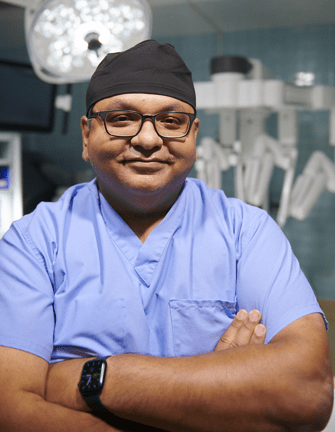Robotic Assisted Surgery - Most Advanced Technology Delivered by Human Hands
- Category: Physicians, Health Education, Robotic-Assisted Care
- Posted On:

Robotic-assisted surgery takes urology care to the next level
Robotic-assisted surgery (RAS) is one of the latest advancements in medicine and has revolutionized minimally invasive surgical treatment for a wide range of conditions. This surgeon-guided technology allows physicians to perform more complex procedures with greater precision, in less time, with less risk and less pain, and with faster recovery times than with traditional surgery. It’s the most advanced technology, delivered by human hands. At Lake Charles Memorial Health System (LCMHS), utilizing this technology has rapidly become the preferred option for surgical procedures for patients who qualify.
When it comes to urologic health, there are many conditions for which RAS is a proven intervention, including prostate cancer, bladder cancer, kidney cancer, and benign conditions such as UPJ obstruction and vesicoureteral reflux, which is an abnormal flow of urine from the bladder into the ureters or kidneys. When lifestyle changes, medication and non-surgical methods become ineffective in treating conditions, your physician might suggest robotic-assisted surgery.
In the past, surgeons made large incisions in the skin and muscle so that they could reach the area of concern. This is called open surgery. Today doctors still perform open surgery, but they can also perform many urologic and minimally invasive procedures using robotic-assisted surgery.
In December 2019 Farjaad Siddiq, MD, Questions to ask your doctor about robotic-assisted surgery: What medical and surgical options are available for me? Which is best for my situation? What are the differences between open, laparoscopic and robotic-assisted surgery? If I am a candidate for a prostatectomy, how can I prepare for it? Can you tell me about your training, experience and patient outcomes with da Vinci? How will I feel after surgery? What does my recovery care plan look like? How do I help my incisions heal well? Director of Robotics at LCMHS, who has 18-plus years of surgical experience, sought to challenge the status quo. He performed Memorial’s first robotic-assisted surgery. His expertise in advanced urology ushered in a new era of urologic care at LCMHS.
A new approach to prostate surgery
Some urology issues may require a prostatectomy. Traditionally, this could have been done with an open surgery, which requires a long incision in your abdomen. During open surgery, the surgeon looks directly at the surgical area through the incision and removes the prostate gland using hand-held tools.
Using robotic-assisted surgery with da Vinci XI technology requires a few small incisions that surgeons use to insert surgical instruments and a tiny camera. The incisions are about the size of a fingertip. With the da Vinci system console, your surgeon controls and manipulates the fine movements of the robotic arms and remains 100% in control of every movement of the tiny surgical instruments and camera.
The da Vinci system translates every movement your surgeon makes in real time, bending and rotating instruments that move like a human hand, but with a greater range of motion, and delivers 3D high definition views, giving your surgeon a crystal-clear view of the surgical area magnified to 10 times what the human eye can see.

"One thing I am most proud of is my surgical team that's been with me since day one. We are experienced in everything urology." - Farjaad Siddiq, MD
In addition, Dr. Siddiq uses the da Vinci system to perform the following procedures:
- Pyeloplasty for kidney obstruction
- Partial nephrectomy for kidney cancer
- Nephrectomy for kidney cancer
- Radical prostatectomy for prostate cancer
Our team of highly skilled surgeons and staff, coupled with the most advanced medical technology in the world, provides modernized healthcare that’s personal. With shorter recovery times, fewer complications and less pain, choosing robotic-assisted surgery can help you get back to the things you love faster.
If we can help, call us at 337-284-8667. To learn more about Dr. Siddiq, click here.




